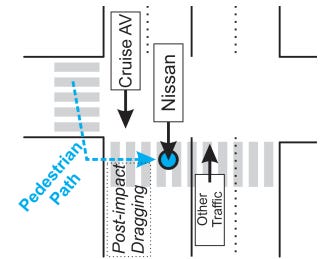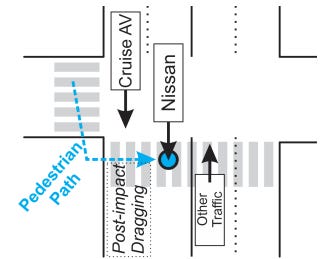We’ve got robots (and companies) misbehaving, other startups hauling in fresh cash, plus new stats and brands in the works… what a Monday!
Cruise’s Failures Were Both Human & Robotic
A new research paper examines AV player Cruise’s infamous October 2023 pedestrian collision in San Francisco, and finds that a multitude of issues were at play. The Cruise AV initially detected a pedestrian in the crosswalk, noted they were crossing against the light, but accelerated anyway, anticipating that the walker would be gone in time (the pedestrian was then first hit by another, human driven vehicle.) That sort of casual behavior may sadly be the way many human motorists operate, which was trained into the AV by machine learning, but likely violates California state laws, which require motorists to reduce speed when they encounter pedestrians in the crosswalk.
After the impact, the car did not realize it had someone stuck underneath, resulting in the victim being dragged. The report notes other issues with the AV’s risk assessment capabilities led to other sub-optimal behavior by the machine. The researchers laud Cruise for starting remote assistance within seconds of the crash, but find that company quickly deviated from its response playbook, which was deemed “too manually intensive,” hunkering down as the company perceived a negative media narrative developing.
Since the incident, Cruise cut both leadership and staff at all levels, reducing spending by hundreds of millions of dollars. GM now seems to be looking to move forward, as the automaker has injected a fresh $850M into the subsidiary, and is ramping up operations in Texas. Anyone operating an AV or robot that interacts with humans can surely learn something from Cruise’s mistakes — the full pre-print paper is available here. Publicizing and learning from mistakes should be celebrated; in comparison, Chinese driverless car companies get the government to take down critical news articles.
Itochu Invests in Gatik
Speaking of autonomous vehicles… Japanese conglomerate Itochu has invested an undisclosed amount into Gatik, the middle-mile robotic delivery truck player. Gatik, which counts Kroger and Walmart as customers, seems to be big in Japan: it recently scored another strategic partnership with Isuzu.
Food Robotics Sales Grow
New data on North American robot orders shows that while the overall industry is softening, the food sector is a rare bright spot. In Q1 2024, the entire robotics space shrunk 30%, after two years of record growth, driven largely by declines in automotive manufacturing. However, “food and consumer goods” were up 120%, compared to the same period in 2023.
Crowdfunding Falters
While any investment carries the risk of the loss of principal, most investors are savvy professionals that know that well. Not so of crowdfunding, where less experienced proletariat often sink their savings into risky companies that promise unrealistic results. The Wall Street Journal takes a look at this practices, highlighting the shortcomings of companies like Aptera and Boxabl. While no foodtech companies get singled out by the Journal, we’ll note that this industry seems awfully fond of the practices as well…
Absolutely apropos of nothing, we’ll note that Arrive Technology has rebranded (again) as Arrive AI (ooh, ahh, artificial intelligence!) The company, formerly known as DroneDek, is a serial crowdfunding seeker, often touting its stock on late night infomercials. Last year, OttOmate took a look at the dispute between Arrive and Valqari over key pieces of intellectual property.
In Other News
Automation and labor concerns steal the show at IDDBA 2024. McDonald’s ends IBM-backed drive-thru automated voice ordering test. Plant based protein startup Tender raises $11M, scores contract with 13-unit Clover Food Lab. Floatic nabs $3.8M for warehouse AMRs.




